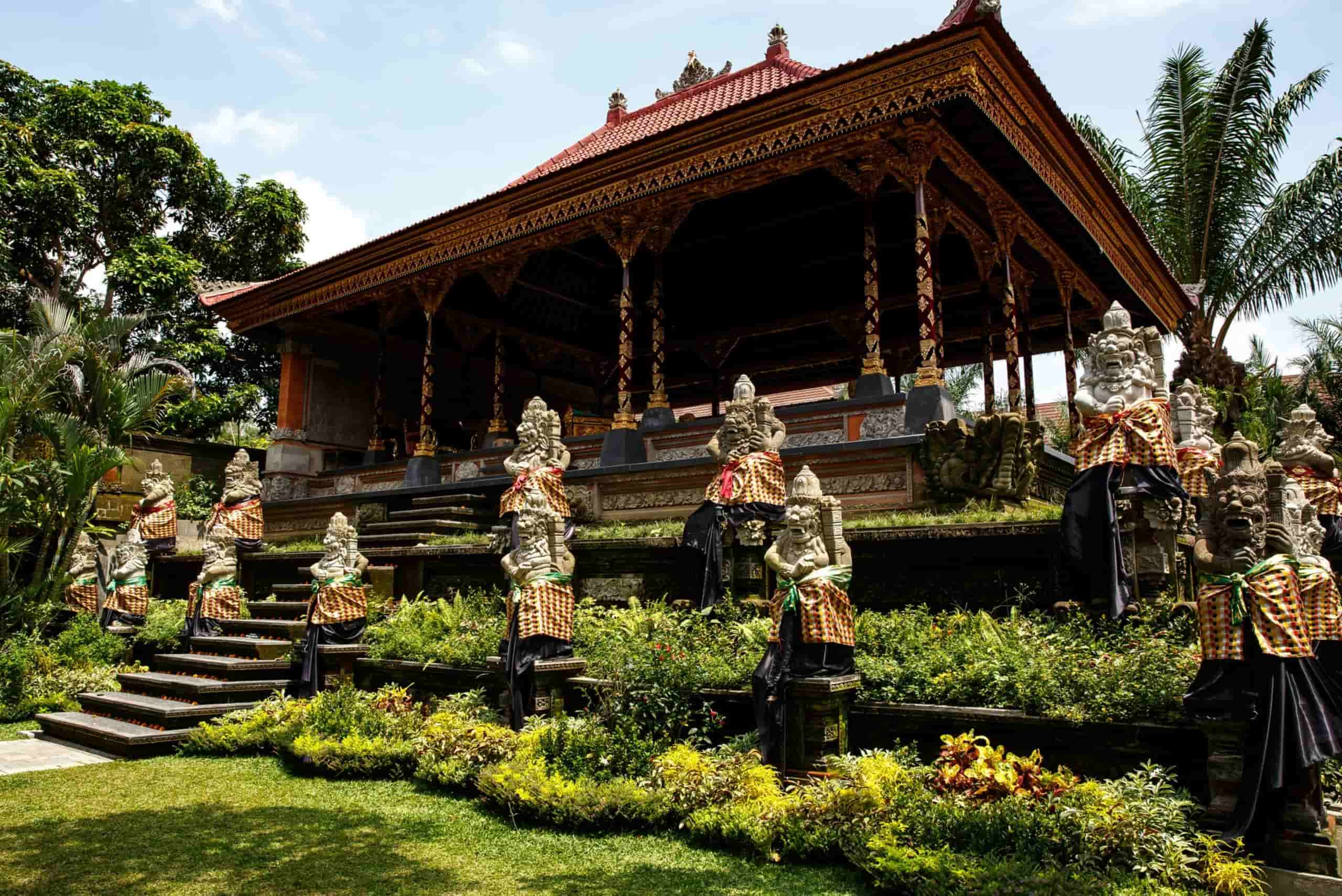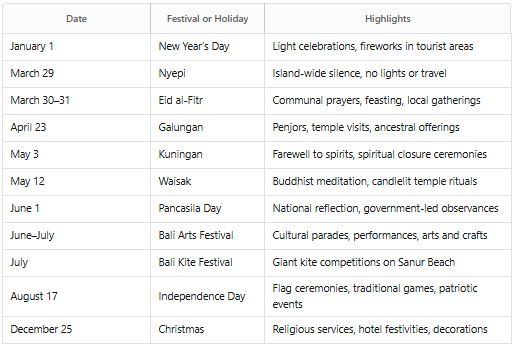Major Public Holidays and Cultural Celebrations in Bali: A Complete Guide to Festivals & Traditions

Bali is home to vibrant cultural celebrations and sacred traditions that shape its calendar year. From temple festivals to national holidays, each occasion invites visitors to connect with the island's spiritual heritage. For travelers seeking an immersive experience with comfort and convenience, hotels in Seminyak Bali offer the ideal location. Montigo Resorts Seminyak places you close to Bali’s most iconic ceremonies while offering a peaceful retreat in the heart of the island’s cultural energy.
Understanding Bali’s Festival Calendars
Pawukon and Saka Calendars
Bali’s vibrant festival culture is deeply rooted in two traditional calendars that shape its ceremonial life—the Pawukon and the Saka calendars. The Pawukon calendar is a unique 210-day cycle used primarily for determining temple anniversaries and traditional rituals. It runs independently of the Gregorian calendar, meaning that important religious events like Galungan and Kuningan shift dates from year to year.
On the other hand, the Saka calendar is a lunar-based Hindu calendar that governs major holidays such as Nyepi, Bali's New Year. This calendar often causes significant observances to fall on different Gregorian dates annually. For travelers, understanding this shifting structure is key to planning around major spiritual moments and cultural gatherings.
Why Bali Celebrates National and Cultural Holidays
While Bali is renowned for its Hindu traditions, it is part of Indonesia’s multi-religious nation. Over 86 percent of the island’s population practices Balinese Hinduism, which greatly influences its local celebrations and religious holidays. However, as a province of Indonesia, Bali also honors national holidays that celebrate the country’s independence, unity, and foundational values.
This unique cultural blend means visitors will find festivals rooted in Hindu philosophy alongside national observances like Independence Day and Pancasila Day. The result is a calendar filled with both deeply spiritual events and patriotic celebrations, often coexisting in ways that reflect the harmony between Bali’s cultural identity and Indonesia’s national spirit.
National Indonesian Holidays in Bali
New Year’s Day (January 1)
In Bali, New Year’s Day aligns with global observances and is officially recognized as a public holiday. While it lacks the spiritual depth of other Balinese festivals, many tourist areas such as Seminyak, Ubud, and Canggu host celebrations ranging from beach parties to fireworks. Locals often observe the day quietly, using it as a time to rest after year-end family gatherings or local ceremonies.
Travel Tip: Expect increased accommodation prices and crowding in tourist hubs. For a quieter experience, consider spending the day in the northern or eastern parts of the island.
Pancasila Day (June 1)
Pancasila Day marks the birth of Indonesia’s foundational philosophical framework. Although not widely celebrated with parades or festivities in Bali, the day holds national importance. Government institutions and schools use the occasion to promote reflection on values such as unity, diversity, and social justice.
In Bali, ceremonies may take place in government offices, but public life continues mostly as usual. It’s an excellent opportunity to learn about Indonesia’s guiding principles through local exhibitions or cultural centers.
Independence Day (August 17)
Independence Day in Bali is a spirited celebration of freedom and national pride. Schools, villages, and government buildings are adorned with red and white flags, and the national anthem echoes through the air. Communities organize traditional games such as panjat pinang, where participants climb greased poles to grab prizes, offering both entertainment and a taste of grassroots culture.
Travel Tip: Popular tourist spots may hold street performances or informal festivities. Expect mild traffic disruptions around town centers and flag ceremonies, especially in Denpasar and Ubud.
Major Religious Holidays and Observances
Nyepi (Balinese Day of Silence)
Nyepi is one of Bali’s most sacred and unique holidays, marking the Saka New Year with a 24-hour period of silence, fasting, and self-reflection. Leading up to Nyepi, communities participate in Melasti, a purification ritual where sacred objects are taken to the sea. On the eve of Nyepi, massive Ogoh-Ogoh effigies—representing demons—are paraded through the streets and then ceremonially burned to cleanse the island of negativity.
During Nyepi itself, the island shuts down entirely. The airport closes, streets are deserted, and even lights are dimmed. Visitors are expected to remain indoors, making it a profound experience of stillness rarely encountered elsewhere.
Visitor Advice: Stock up on food and essentials the day before. Use the time to rest, meditate, or quietly observe the serenity that envelops the island.
Galungan and Kuningan (April 23 and May 3, 2025)
Galungan celebrates the triumph of dharma (good) over adharma (evil), a cornerstone of Balinese Hindu belief. The holiday is marked by the stunning sight of penjors—bamboo poles decorated with coconut leaves—lining the streets, symbolizing gratitude to the gods. Families dress in traditional attire, make offerings at ancestral temples, and reunite to honor their heritage.
Kuningan, held ten days later, concludes the celebrations. It is believed that ancestral spirits return to the heavens on this day, and additional offerings are made to bid them farewell.
The mood is festive yet reverent, making it a perfect window for cultural immersion.
Waisak (Vesak Day) – May 12, 2025
Waisak, also known as Vesak Day, commemorates the birth, enlightenment, and death of Siddhartha Gautama—the historical Buddha. Though Bali is predominantly Hindu, its Buddhist minority celebrates with meditation sessions, chanting, and candlelit processions at temples.
In areas like Singaraja and central Bali, visitors may witness peaceful ceremonies that contrast with the island’s more vibrant Hindu rituals, offering insight into Indonesia’s religious diversity.
Eid al-Fitr (Hari Raya Idul Fitri) – March 30 to 31, 2025
Eid al-Fitr, marking the end of Ramadan, is a joyous occasion for Muslims across Indonesia, including Bali’s Islamic communities. It is a time for forgiveness, charity, and family reunions. Traditional dishes like ketupat and opor ayam are shared during communal feasts, and many locals travel to their hometowns during the annual "mudik" migration.
While Bali remains quieter during Eid, the atmosphere in places like Denpasar and Singaraja becomes festive, with open houses and neighborhood celebrations.
Visitor Note: Travel services may be limited during this period as many workers return home. Book transportation and accommodations in advance.
Christmas – December 25
Christmas in Bali is widely celebrated among the Christian population and embraced by the hospitality sector. Churches across the island hold midnight masses, and hotels decorate their lobbies with Christmas trees and lights. Restaurants offer special menus and live music, making it a festive time for tourists as well.
Beyond the decorations, the holiday spirit fosters unity across religious lines, with many Balinese joining the celebration in solidarity and good cheer.
2025 Festival Calendar at a Glance

Cultural Festivals and Community Events
Bali Arts Festival (June to July)
The Bali Arts Festival is one of the island’s most anticipated cultural events. Held annually at Taman Werdhi Budaya in Denpasar, this month-long celebration showcases Bali’s rich artistic traditions through a series of performances, exhibitions, and cultural parades.
Expect to see gamelan orchestras, traditional dance troupes, theater, and intricate craftwork. Both local and international artists participate, turning Denpasar into a cultural stage. This is an ideal opportunity for travelers to experience authentic Balinese heritage.
Insider Tip: The opening parade features colorful processions, dramatic costumes, and live performances that set the tone for the entire festival.
Bali Kite Festival (July)
Hosted on the breezy coast of Sanur Beach, the Bali Kite Festival is a spectacular display of traditional kite craftsmanship and local pride. Villages across Bali compete to launch massive kites that resemble birds, dragons, and Hindu deities. Some are over ten meters in length.
These kites are more than playful creations—they are offerings to the gods to ensure good harvests. Accompanied by gamelan music and enthusiastic cheering, the festival blends competition with spiritual meaning.
Travel Tip: Arrive early for the best viewing angles and photo opportunities during the competitions.
Omed-Omedan (The Kissing Festival)
Celebrated in Sesetan Village the day after Nyepi, Omed-Omedan is a lighthearted ritual for unmarried young adults. Participants are pushed toward each other by the crowd, leading to playful kissing and splashing of water. The event is rooted in village legend and is believed to bring blessings and prosperity.
This joyous gathering is a symbol of community spirit and youthful energy. Visitors can watch from designated areas while enjoying the cheerful chaos.
Travel Tips for Visiting During Festivals
Book Early for Major Celebrations
Popular festivals such as Nyepi, Galungan, and the Bali Arts Festival attract visitors from around the world. Accommodations and flights often fill quickly. Book at least one to two months in advance to secure your plans.
Show Respect for Local Customs
During sacred ceremonies, dress modestly. Wear a sarong and sash when visiting temples. Remain quiet and observe respectfully. On Nyepi, even tourists must follow the rules: stay inside, keep lights off at night, and avoid noise or digital activity.
Pair Spiritual and Festive Experiences
Balance your itinerary by attending both solemn rituals and joyful celebrations. For example, witness the profound silence of Nyepi, then enjoy the vibrant Bali Kite Festival or the community-driven Omed-Omedan.
Be Flexible with Festival Dates
Many holidays in Bali are determined by traditional calendars, so dates can shift. Stay updated by checking local calendars or asking hotel staff for the latest information. Adjust your itinerary if needed to fully experience the cultural events.
Conclusion
Bali’s festivals and holidays offer unforgettable insight into local tradition and community life. Staying at Montigo Resorts Seminyak allows you to enjoy these cultural moments while relaxing in a setting designed for comfort and connection. Whether you are visiting for a specific celebration or exploring the island’s cultural rhythm, Montigo Resorts is your perfect starting point.
Frequently Asked Questions (FAQ)
What is Nyepi and why is it unique?
Nyepi is the Balinese Hindu New Year, marked by a full day of silence, fasting, and meditation. The island closes completely, including the airport and internet services. It is considered a powerful time for self-purification and renewal.
Why do Galungan and Kuningan occur on different dates every year?
These holidays follow the 210-day Pawukon calendar, which causes them to rotate across the Gregorian calendar. They are always ten days apart and occur multiple times within a single Western year.
Can tourists participate in Balinese festivals?
Yes, tourists are welcome to respectfully observe or participate in public aspects of most festivals. Always ask permission before entering temple areas or taking photos, and follow dress codes when required.
Do businesses close during holidays?
Yes, some local shops and government offices close during major religious festivals, especially Nyepi and Galungan. However, businesses in tourist areas often remain open, though with limited hours or staffing.
Which festivals are recommended for first-time visitors?
Nyepi is unforgettable for its island-wide silence. The Bali Arts Festival is ideal for cultural immersion. Galungan and Kuningan provide a strong sense of spiritual tradition, while the Kite Festival offers colorful entertainment.
